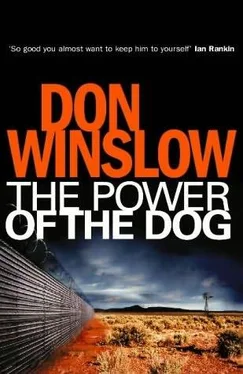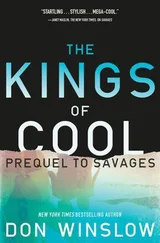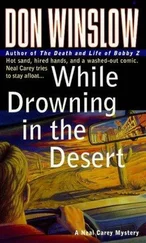Don Winslow - The Power of the Dog
Здесь есть возможность читать онлайн «Don Winslow - The Power of the Dog» весь текст электронной книги совершенно бесплатно (целиком полную версию без сокращений). В некоторых случаях можно слушать аудио, скачать через торрент в формате fb2 и присутствует краткое содержание. Жанр: Триллер, на английском языке. Описание произведения, (предисловие) а так же отзывы посетителей доступны на портале библиотеки ЛибКат.
- Название:The Power of the Dog
- Автор:
- Жанр:
- Год:неизвестен
- ISBN:нет данных
- Рейтинг книги:3 / 5. Голосов: 1
-
Избранное:Добавить в избранное
- Отзывы:
-
Ваша оценка:
- 60
- 1
- 2
- 3
- 4
- 5
The Power of the Dog: краткое содержание, описание и аннотация
Предлагаем к чтению аннотацию, описание, краткое содержание или предисловие (зависит от того, что написал сам автор книги «The Power of the Dog»). Если вы не нашли необходимую информацию о книге — напишите в комментариях, мы постараемся отыскать её.
The Power of the Dog — читать онлайн бесплатно полную книгу (весь текст) целиком
Ниже представлен текст книги, разбитый по страницам. Система сохранения места последней прочитанной страницы, позволяет с удобством читать онлайн бесплатно книгу «The Power of the Dog», без необходимости каждый раз заново искать на чём Вы остановились. Поставьте закладку, и сможете в любой момент перейти на страницу, на которой закончили чтение.
Интервал:
Закладка:
It’s the first time he’s put a word to it, Adan thinks. The Federation. With himself as its head. Not by title, but by positioning.
“If you accept this arrangement,” Barrera says, “I will share what is mine. My friends will be your friends, my protection your protection.”
“How much will we pay for this protection?” Abrego asks.
“A modest fee,” Barrera says. “Protection is expensive.”
“How expensive?”
“Fifteen percent.”
“Barrera,” Abrego says. “You divide the country into plazas. All very well and good. Abrego will accept the Gulf. But you have forgotten something-in slicing up the fruit, you slice up nothing. There is nothing left. Our fields are burned and poisoned. Our mountains are overrun with policia and Yanquis. So you give us markets-there is no opium for us to sell in these new markets of ours.”
“Forget opium,” Barrera says.
“And the yerba-” Guero begins.
“Forget the marijuana, too,” Barrera says. “It’s small stuff.”
Abrego holds his arms out and says, “So, Miguel Angel, El Angel Negro, you tell us to forget la mapola and la yerba. What would you have us grow?”
“Stop thinking like a farmer.”
“I am a farmer.”
“We have a two-thousand-mile land border with the United States,” Barrera says. “Another thousand miles by sea. That’s the only crop we need.”
“What are you talking about?” Abrego snaps.
“Will you join the Federacion?”
“Sure, yes,” Abrego says. “I accept this Federation of Nothing. What choice do I have?”
None, Adan thinks. Tio owns the Jalisco State Police and is partners with the DFS. He’s staged an overnight revolution through Operation Condor and come out on top. But-and Abrego is also right about this-on top of what?
“El Verde?” Barrera asks.
“Si.”
“Mendez?”
“Si, Don Miguel.”
“Then, hermanos,” Barrera says. “Let me show you the future.”
They repair to a heavily guarded room in the hotel that Barrera owns next door.
Ramon Mette Ballasteros is waiting for them.
Mette is a Honduran, Adan knows, usually connected with the Colombians in Medellin, and the Colombians do little if any business through Mexico. Adan watches him dissolve powder cocaine into a beaker containing a mixture of water and bicarbonate of soda.
He watches as Mette fixes the beaker over a burner and turns the flame up high.
“It’s cocaine,” Abrego says. “So what?”
“Watch,” Barrera says.
Adan watches as the solution starts to boil and listens as the coke makes a funny crackling sound. Then the powder starts to come together into a solid. Mette carefully removes it and sets it out to dry. When it does, it forms a ball that looks like a small rock.
Barrera says, “Gentlemen, meet the future.”
Art stands in front of Santo Jesus Malverde.
“I made you a manda,” Art says. “You kept your part of the deal, I’ll keep mine.”
He leaves the shrine and takes a taxi to the edge of the city.
Already the shantytown is going up.
The refugees from Badiraguato are turning cardboard boxes, packing crates and blankets into the makings of new homes. The lucky and the early have found sheets of corrugated tin. Art even sees an old movie billboard-True Grit-being raised as a roof. A sun-faded John Wayne looks down at the group of families building walls from old sheets, odd bits of plywood, broken cinder blocks.
Parada has found some old tents-Art wonders, Did he browbeat the army?-and has set up a soup kitchen and a makeshift clinic. Some boards laid on sawhorses make a serving table. A tank of propane feeds a flame that heats a thin sheet of tin on which a priest and some nuns are heating soup. Some women are making tortillas on a grill set over an open fire a few feet away.
Art goes into a tent where nurses are washing children, swabbing their arms in preparation for the tetanus shots the doctor is administering for small cuts and wounds. From another part of the big tent, Art hears kids screaming. He moves closer and sees Parada cooing softly to a little girl with burns on her arms. The girl’s eyes are wide with fear and pain.
“The richest opium soil in the Western world,” says Parada, “and we have nothing to ease a child’s pain.”
“I’d change places with her if I could,” Art says.
Parada studies him for a long moment. “I believe you. It’s a pity that you can’t.” He kisses the girl’s cheek. “Jesus loves you.”
A little girl in pain, Parada thinks, and that’s all I have to say to her. There are worse injuries as well. We have men beaten so badly the doctors have had to amputate arms, legs. All because the Americans can’t control their own appetite for drugs. They come to burn the poppies, and they burn children. Let me tell you, Jesus, we could use you in person right now.
Art follows him through the tent.
“ 'Jesus loves you,’ ” Parada mutters. “Nights like this make me wonder if that’s just crap. What brings you here? Guilt?”
“Something like that.”
Art takes money from his pocket and offers it to Parada. It’s his last month’s salary.
“It will buy medicine,” Art says.
“God bless you.”
“I don’t believe in God,” Art says.
“Doesn’t matter,” Parada says. “He believes in you.”
Then He, Art thinks, is a sucker.
Chapter Two
Where e'er we go, we celebrate
The land that makes us refugees,
From fear of priests with empty plates
From guilt and weeping effigies.
- Shane MacGowan,“Thousands Are Sailing”Hell’s Kitchen
New York City, 1977
Callan grows up on bloody fables.
Cuchulain, Edward Fitzgerald, Wolfe Tone, Roddy McCorley, Padraic Pearse, James Connelly, Sean South, Sean Barry, John Kennedy, Bobby Kennedy, Bloody Sunday, Jesus Christ.
The rich red stew of Irish Nationalism and Catholicism, or Irish Catholic Nationalism, or Irish National Catholicism. Doesn’t matter. The walls of the small West Side walk-up and the walls of St. Bridget’s Elementary are decorated, if that’s the word, with bad pictures of martyrdom: McCorley dangling from the Bridge of Toome; Connelly tied to his chair, facing the British firing party; Saint Timothy with all them arrows sticking out of him; poor, hopeless Wolfe Tone slicing his own neck with a razor but fucking it up and severing his windpipe instead of his jugular-anyway, he manages to die before they manage to hang him; poor John and poor Bobby looking down from heaven; Christ on the Cross.
Of course there are the Twelve Stations of the Cross in St. Bridget’s itself. Christ being whipped, the Crown of Thorns, Christ staggering through the streets ofJerusalem with the Cross on his back. The nails going in his blessed hands and feet. (A very young Callan asks the sister if Christ was Irish, and she sighs and tells him, No, but he might as well have been.)
He’s seventeen years old and he’s slamming beers in the Liffey Pub on Forty-seventh and Twelfth with his buddy O-Bop.
Only other guy in the bar besides Billy Shields the bartender is Little Mickey Haggerty. Little Mickey’s sitting at the far end of the bar doing some serious drinking behind an upcoming date with a judge who’s a lock to put him eight-to-twelve from his next Bushmills. Little Mickey came in with a roll of quarters, all of which he fed into the jukebox while pressing the same button. E-5. So Andy Williams has been crooning “MoonRiver” for the past hour, but the boys don’t say nothing because they know all about Little Mickey’s hijacking beef.
It’s one of those killerNew York August afternoons-one of those “It’s not the heat, it’s the humidity” afternoons-when shirts stick to backs and grudges just plain stick.
Читать дальшеИнтервал:
Закладка:
Похожие книги на «The Power of the Dog»
Представляем Вашему вниманию похожие книги на «The Power of the Dog» списком для выбора. Мы отобрали схожую по названию и смыслу литературу в надежде предоставить читателям больше вариантов отыскать новые, интересные, ещё непрочитанные произведения.
Обсуждение, отзывы о книге «The Power of the Dog» и просто собственные мнения читателей. Оставьте ваши комментарии, напишите, что Вы думаете о произведении, его смысле или главных героях. Укажите что конкретно понравилось, а что нет, и почему Вы так считаете.












